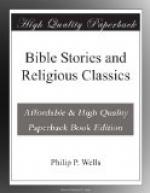“Read your book,” the teacher urged, mildly and earnestly; but she looked at him with her black sparkling eyes, and when he put questions to her also, she knew more than all the others. She had listened, understood, and kept his words.
Her father was a poor honest man, and when first he brought her to the school, he had made the stipulation that she should not be taught the Christian faith. To let her go away during the Scripture lesson might, however, have given offence, and raised thoughts of various kinds in the minds of the other children, and so she stayed; but this could not go on any longer.
The teacher went to her father, and told him that either he must take his daughter away from the school, or consent to her becoming a Christian.
“I cannot bear to see those burning eyes, that yearning, that thirst of the soul, as it were, after the words of the gospel,” said the teacher.
And the father burst into tears. “I know but little myself of our own religion, but her mother was a daughter of Israel, of strong and firm faith, and on her dying bed I made a vow that our child should never receive Christian baptism; that vow I must keep; it is to me as a convenant with God.”
And the little Jewish girl was taken away from the school of the Christians.
Years rolled by.
In one of the smallest towns of Jutland served as maid in a plain burgher’s house a poor girl of the Mosaic faith; this was Sarah. Her hair was black as ebony, her eyes dark, and yet brilliant and full of light, such as you see among the daughters of the East; and the expression in the countenance of the grown-up girl was still that of the child who sat on the school-room bench, listening with thoughtful and wistful eye.
Each Sunday sounded from the church the pealing of the organ to the song of the congregation, and the tones floated over the street, into the house, where the Jewish girl attended to her work, diligent and faithful in her calling. “Remember the Sabbath day to keep it holy,” this was her law; but her Sabbath was a day of labor to the Christians, and only in her heart could she keep it holy; and that was not enough for her. But when the thought arose in her soul, “What matters it before God about days and hours?” and on the Sunday of the Christians her hour of devotion remained undisturbed. If, then, the organ’s peal and the psalm-tunes reached over to her, where she stood in the kitchen, even this became a quiet and consecrated spot. She would read then the treasure and peculiar property of her people, the Old Testament, and this alone; for she kept deep in her heart what her father had told the teacher and herself when she was taken from the school—the vow made to her dying mother, “that Sarah should not be baptized, not forsake the faith of her fathers.” The New Testament was, and should remain forever, a sealed book to her; and yet she knew much of it; it shone to her through the recollections of childhood.




